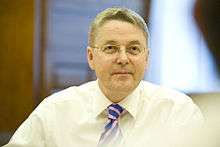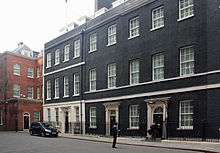Cabinet Secretary (United Kingdom)
| Cabinet Secretary | |
|---|---|
|
Arms of Her Majesty's Government | |
| Cabinet Office | |
| Style | The Right Honourable |
| Appointer | Prime Minister |
| Inaugural holder | Maurice Hankey |
| Formation | 1916 |
.svg.png) |
| This article is part of a series on the politics and government of the United Kingdom |
|
|
|
|
The Cabinet Secretary is the most senior civil servant in the United Kingdom. He or she acts as the senior policy adviser to the Prime Minister and Cabinet and as the Secretary to the Cabinet, responsible to all Ministers for the running of Cabinet Government. The role is currently occupied by Jeremy Heywood, appointed in January 2012; in succession to Gus O'Donnell, 2005–2012.
The position of Cabinet Secretary was created in 1916 for Maurice Hankey, when the existing secretariat of the Committee of Imperial Defence, headed by Hankey, became secretariat to a newly organised War Cabinet.[1]
Since 1981[2] and until the end of 2011, the position of Cabinet Secretary has been combined with the roles of Head of the Home Civil Service and Permanent Secretary of the Cabinet Office. The first means that the Cabinet Secretary is responsible for all the civil servants of the various departments within government (except the Foreign Office), chairing the Permanent Secretaries Management Group (PSMG) which is the principal governing body of the civil service. The second means that the Cabinet Secretary is responsible for leading the government department that provides administrative support to the Prime Minister and Cabinet. The post is appointed by the Prime Minister with the advice of the out-going Cabinet Secretary and the First Civil Service Commissioner.[3]
The responsibilities of the job vary from time to time and depend very much on the personal qualities of both the Prime Minister and Cabinet Secretary of the day. In most cases the true influence of the Cabinet Secretary extends far beyond administrative matters, and reaches to the very heart of the decision making process. For instance, the Cabinet Secretary is responsible for administering the Ministerial Code which governs the conduct of ministers (also known as the Rule Book and formerly Questions of Procedure for Ministers). In this duty the Cabinet Secretary may be asked to investigate "leaks" within government, and enforce Cabinet discipline. Unusually in a democracy, this gives the unelected Cabinet Secretary some authority over elected ministers (a situation satirised in the BBC sitcom Yes, Prime Minister), although the constitutional authority of the Code is somewhat ambiguous.
The Cabinet Secretary is responsible for overseeing the intelligence services and their relationship to the government, though since 2002 this responsibility has been delegated to a full-time role (initially as Security and Intelligence Co-ordinator, now the Head of Intelligence, Security & Resilience working to the National Security Adviser), with the Cabinet Secretary focussing on civil service reforms to help deliver the government's policy programme.
It was announced on 11 October 2011 that O'Donnell would retire at the end of 2011, and following this the three roles currently performed by the Cabinet Secretary will be split: the Cabinet Secretary will provide policy advice to the Prime Minister and Cabinet; the Head of the Home Civil Service will provide leadership for the whole Civil Service; and the Permanent Secretary will oversee the Cabinet Office.[4] It was announced later that the occupiers would be: Cabinet Secretary, Jeremy Heywood; Head of the Home Civil Service, Bob Kerslake, the Permanent Secretary at the Department for Communities and Local Government; and lastly, Permanent Secretary at the Cabinet Office, Ian Watmore.[5]
In July 2014 it was announced that Kerslake would step down and Heywood would take the title of Head of the HCS with a "Chief Executive" of the HCS reporting to Heywood and holding Watmore's post at the Cabinet Office.
List of Cabinet Secretaries
- Maurice Hankey, 1916–1938
- Edward Bridges, 1938–1946
- Norman Brook, 1947–1962
- Burke Trend, 1963–1973
- John Hunt, 1973–1979
- Robert Armstrong, 1979–1987
- Robin Butler, 1988–1998
- Richard Wilson, 1998–2002
- Andrew Turnbull, 2002–2005
- Gus O'Donnell, 2005–2012
- Jeremy Heywood, 2012–present
See also
References
- ↑ "Development of Cabinet government". The National Archives.
- ↑ Sampson, Anthony (1982). The Changing Anatomy of Britain. Anatomy of Britain. Hodder and Stoughton. p. 171. ISBN 0-340-20964-X.
- ↑ Prime Minister's Official Spokesman (15 June 2005). "Sir Gus O'Donnell". Downing Street Says (unofficial record). Archived from the original on 13 July 2005. Retrieved 2011-12-22.
- ↑ HM Government (11 October 2011). "Cabinet Secretary announces retirement". Number 10 website. Retrieved 2011-12-22.
- ↑ Civil Service Live Network. "Kerslake to head the civil service with promise of 'visible leadership'". Retrieved 1 January 2012.
External links
- Cabinet Office
- Jeremy Heywood's official page

